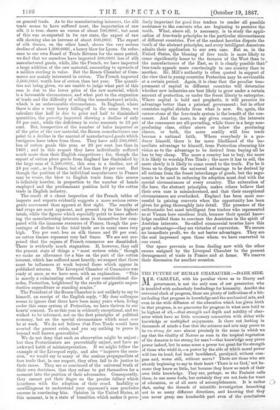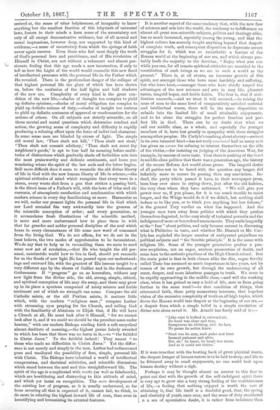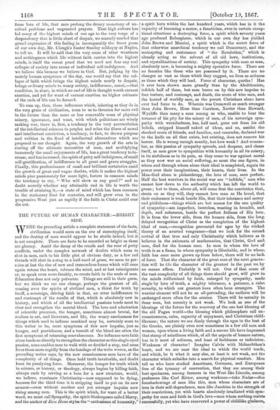THE FUTURE OF HUMAN CHARACTER :—DARK SIDE.
MR. CARLYLE, with his peculiar views as to liberty and government, is not the only man of our generation who is troubled with melancholy forebodings for humanity. Amidst the universal clack of progress, there are plenty of indications of a bit- ter feeling that progress in knowledge and the mechanical arts, and even in the wide diffusion of the education which has given birth to that progress, is no guarantee for progress in what men hold to be highest of all,—that strength and depth and nobility of char- acter which have so little necessary connection with either wide knowledge or multiplied enjoyments. Is there not lurking in thousands of minds a fear that the sciences and arts may prove to be too strong for man almost precisely in the sense in which we say that the vitality of Nature as seen in the tropical vegetation of the Amazon is too strong for man 2—that knowledge may prove power indeed, but in some sense a power too great for the strength of those who wield it,—a power by the side of which moral power will lose its head, feel itself bewildered, paralyzed, without com- pass and, worse still, without nerve? There are those who are already beginning to say in their heart 'There is no God,' not be- cause they know so little, but because they know so much of their own little knowledge. They are, perhaps, as the Psalmist calls them, in one sense fools, but certainly they are not fools for want of education, or of all sorts of accomplishments. It is rather that, seeing the threads of scientific investigation branching out in so many different directions, and knowing that they can never grasp one hundredth part even of the conclusions arrived at, the sense of utter helplessness, of incapacity to know anything but the smallest fraction of this labyrinth of universal laws, fosters in their minds a keen sense of the uncertainty not only of all except demonstrative evidence, but of all mental and moral impressions, however deep, not supported by this kind of evidence,—a sense of uncertainty from which the springs of faith never again recover. Even those who feel most deeply the truth of God's personal love and providence, and of His revelation of Himself in Christ, are not without a vehement and almost pas- sionate feeling that this age needs a new incarnation, if only to tell us how the Light of the world would reconcile this new flood of intellectual processes with the personal life in the Father which He revealed. There is the profoundest danger of the collapse of that highest personal life the glory of which has been shown us, before the confusion of the half lights and half shadows of the new era. Complexity of every kind is the great con- dition of the new life,—shades of thought too complex to yield up definite opinions,—shades of moral obligation too complex to yield up definite axioms of duty,—shades of insight too various to yield up definite sentences of approval or condemnation for the actions of others. On all subjects not strictly scientific, on all those mental and moral questions which determine conduct and action, the growing sense of complexity and difficulty is rapidly producing a relaxing effect upon the force of individual character. In some sense men are blinded by excess of light. The simple old moral law, ' Thou shalt not kill,' 4 Thou shalt not steal,' 4 Thou shalt not commit adultery,' Thou shalt not covet thy neighbour's goods,' is apt to lose half its meaning before multi- tudes of distinctions which gradually shade off forbidden acts into the most praiseworthy and delicate sentiments, and leave you wondering where the spirit of the law ends and the letter begins. Still more difficult does it seem to reconcile the old divine liberty of life in God with the new human liberty of life in science,—the spiritual attitudes of mind which recognize that every wave in a storm, every waste shot from a gun that strikes a passing bird, is the direct issue of a Father's will, with the laws of tides and air currents, of atmospheric rarefaction and condensation with which modern science is every day familiarizing us more. Harmonize as we will, under our present lights the personal life in God which our Lord revealed fits very awkwardly into the grooves of the scientific conception of order ; and every generation, as it accumulates fresh illustrations of the scientific method, is more and more embarrassed how to piece them in with that far grander and nobler personal discipline of the soul which hears in every circumstance of life some new word of command from the living God. We do not affirm, for we do not in the least believe, the two modes of apprehension to be inconsistent. We do say that to help us in reconciling them we seem to need some new act of revelation,—that He who taught the old per- sonal, unscientific world how to live in God, should yet reconcile for us the floods of new light He has poured upon our understand- ings and outward life, with the greatest of His lessons taught to a very different age by the shores of Galilee and in the darkness of Gethsemane. If " progress " go on as heretofore, without any new light from the divine side, the old, strong, simple, ethical, and spiritual conception of life may die away, and there may grow up in its place a spurious compound of misty science and feeble sentiment out of which no strength can come. Compare the old Catholic saints, or the old Puritan saints, it matters little which, with the modern " religious man ;" compare Luther with streaming eyes praying for the Church, and telling God with the familiarity of Abraham or Elijah that, if He will have a Church at all, He must look after it Himself, " for we cannot look after it, and if we could we should be the proudest asses under heaven," with our modern Bishops sending forth a soft encyclical almost destitute of meaning,—the highest praise falsely awarded to which has been that there was no harm in it,—to " the faithful in Christ Jesus." To the faithful indeed 1 They meant " to those who made no difficulties in Christ Jesus." Yet the differ- ence is not merely and simply in the men. Luther had rediscovered pure and unalloyed the possibility of free, simple, personal life with Christ. The Bishops have inherited a world of intellectual compromises, and doctrinal subtleties, and scientific discussions which stand between the soul and this straightforward life. The spirit of the age is complicated with truths (as well as falsehoods), which are bewildering and distracting to this attitude of mind, and which yet insist on recognition. The mere development of the existing law of progress, as it is usually understood, so far from securing all that is expected of it, cannot fail, we think, to do more in relaxing the highest inward life of man, than even in beautifying and humanizing its external features. It is another aspect of the same tendency that, with the new flow of sciences and arts into the world, the tendency to indifference on almost all great non-scientific subjects, politics and theology alike, has so much increased, especially among the young, and that the highest culture has scarcely taught anything beyond that despair of complete truth, and consequent disposition to deprecate severe struggles for it, which was so remarkable a feature of the Roman world at the beginning of our era, and which always pro- bably leads the majority to the doctrine, " Enjoy what you can while you can, for all remote spiritual attitudes are unsuited to the constitution of such beings as we are in such a world as the present." There is, at all events, an immense growth of this spirit, not amongst those who have most hardship and suffering, but who have least,—amongst those who have chiefly reaped the advantages of the new sciences and arts in easy life, pleasant tastes, languid hopes, and feeble faiths. The fear is, that if civi- lization succeeds,—and we trust it will succeed,—in raising the mass of men to the same level of comparatively satisfied material and intellectual wants, there will be the same disposition to subside into the limited life of small attainable enjoyments, and to let alone the struggles for perfect freedom and per- fect life in God. There can be no doubt that what we call our middle class, as a whole, and especially the younger members of it, have lost greatly in sympathy with these struggles amongother peoples. Mr. Carlyle's teaching about slavery—earnest in its own immoral kind—has not truly convinced half as many as it has given an excuse for refusing to interest themselves on the side of the victim,—for insisting on judging of the American War, for example, by canons of mere taste. That there is nothing of the heart in middle-class politics that there was a generation ago, the history of the recent Reform Act would alone prove. The languid desire of all parties not to be bored with the question any longer, did infinitely more to ensure its passing than any conviction. In- deed, the party which passed it have, in their newspaper press, been busy ever since in crying down, just after the old fashion, the very class whom they have enthroned. " We will give you power over us, if you please, for it is too much trouble to resist longer, and the Whigs would do it if we didn't, but nothing shall induce us to like you, or to think you anything but low fellows," is the general Tory verdict on what has happened. And the younger men turn away from politics with which they profess themselves disgusted, to the easy study of technical pursuits and the indulgence of more or less refined amusements. They smile languidly at the " fuss " about politics, and only become earnest in discussing what is Philistine in taste, and whether Mr. Disraeli or Mr. Car- lyle has exploded the larger number of antiquated prejudices on political subjects and " the Semitic principle." It is the same with religious life. Some of the younger generation profess a pas- sive scepticism, not an eager, anxious prosecution of doubt, and some lean to the aesthetic practices of the High Church school. But the main point is that in both classes alike the dim, vague faculty called Taste has assumed so much importance in late years, not by reason of its own growth, but through the undermining of all surer, deeper, and more laborious passages to truth. We seem to be rapidly approaching in the middle class,—and will the working class, when it has gained as easy a hold of life, save us from going further in the same road?—to that condition of things, that attenuated faith, those petty momentary interests, that hopeless vision of the excessive complexity of truth on all high topics, which drove the Roman world into despair at the beginning of our era,— a despair from which a simple belief in a simple revelation of divine acts alone saved it. Mr. Arnold has finely said of it :— " Like ours it looked in outward air,
Its head was clear and true, Sumptuous its clothing, rich its fare, No pause its action knew.
"Steel was its arm, each pulse and bone Seemed puissant and alive, Put, ah ! its heart, its heart was atone, And so it could not thrive."
If it were true that with the beating back of great physical wants, the deepest hunger of human nature is to be laid to sleep, and life to be frittered away in small enjoyments, no one could look upon human destiny without a sigh.
Perhaps it may be thought almost an answer to this fear to point out that with the growth of the self-indulgent spirit there is very apt to grow also a very strong feeling of the worthlessness of life, —a feeling that nothing enjoyed is worth the cost of obtaining it, that life itself is a doubtful good, that, the spring and elasticity of youth once over, and the sense of duty smothered n a sea of speculative doubt, it is rather from indolence than from love of life, that men prolong the dreary monotony_ of un- solved problems and ungranted prayers. That high culture has led many of the highest minds of our age to the very verge of a despondency that is little short of despair, we scarcely needed that grand expression of this feeling in incomparably the finest poem of our own day, Mr. Clough's Easter Sunday soliloquy at Naples, to tell us. It will be said that the very sense of utter weariness and nothingness which life without faith carries into the highest minds, is itself the surest proof that we need not fear any real collapse of society into atoms of individual self-indulgence. And we believe this because we believe in God. But, judging by the merely human symptoms of the day, one would say that the col- lapse of faith which brings the highest minds nearly to despair, brings ordinary minds to weary satiety, indifference, ennui,—that condition, in short, in which no end of life is thought worth earnest exertion, and yet for want of earnest exertion no higher estimate of the ends of life can be formed.
To sum up, then, those influences which, inhering as they do in the very grain of civilization, seem to us to threaten far more evil in the future than the more or less removable mass of physical misery, ignorance, and want, with which politicians are wisely making war, there is, first, a tendency in the very accumulation of the intellectual sciences to perplex and relax the fibres of moral and intellectual conviction, a tendency, in fact, to drown purpose and volition in the flood of intellectual alternatives which are proposed to our thought. Again, the very growth of the arts in staving off the ultimate necessities of man, and multiplying immensely the small enjoyments of life, has a great tendency to in- crease, and has increased, the spirit of petty self-indulgence, of small self-gratification, of indifference to all great and grave struggles. Finally, this predominance of small and brilliant certainties amid the growth of great and vague doubts, while it makes the highest minds pine passionately for more light, fosters in common minds the tendency to cry, " Who will show us any good ?" and to doubt secretly whether any attainable end in life is worth the trouble of attaining it,—a state of mind which has been common in the stationary East for centuries, and will grow even in the progressive West just as rapidly if the faith in Christ could ever die out.
































 Previous page
Previous page